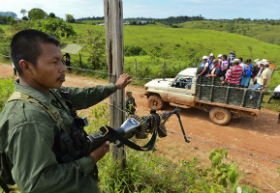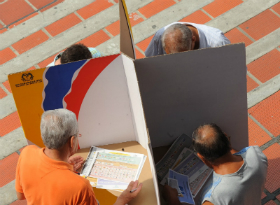Interview
Interview with Zbignev Ivanovski, Doctor of Political Science, Head of the Center for Political Studies at the RAS Institute for Latin American Studies, Professor of Global Processes Department at Lomonosov Moscow State University.
Interview
Interview with Zbignev Ivanovski, Doctor of Political Science, Head of the Center for Political Studies at the RAS Institute for Latin American Studies, Professor of Global Processes Department at Lomonosov Moscow State University.
At the recent National Congress elections the ruling party lost ground to ex-president Alvaro Uribe’s party. Does this affect current president Juan Manuel Santos’ prospects for next May’s presidential elections?
The results of the parliamentary elections in Colombia on March 9, 2014 did somewhat change the country’s political landscape.
In January 2013 the ruling Social Party of National Unity (PSUN) split into the right wing headed by former president Alvaro Uribe (2002-2010) and the Democratic Center, which has also attracted some conservatives and dissenters from other parties.
The irreconcilable differences within the party were rooted in disparate views on domestic armed conflict. Defense minister during the Uribe presidency, Mr. Santos was a strong supporter of the democratic security policy, advocating the suppression of guerillas and lowering the crime rate. But as head of state he changed his mind, choosing instead to back peaceful conflict resolution and launched talks with the insurgents. Segments of Colombian society and the elite who staunchly oppose the dialogue with the guerillas currently underway in Havana, Cuba were displeased with this change of course. They view the Revolutionary Armed Forces of Colombia (FARC) as a terrorist group affiliated with drug trafficking and organized crime, an attitude shared by the United States and the European Union.
These differences, and the fact that relations between the former allies had been irreparably damaged, had a clear impact on the election outcome. The newly-split PSUN lost some clout, garnering just 21 of 102 seats in the Senate and 36 of 166 seats in the Chamber of Representatives (28 and 48 in 2010-2014, respectively). Implacably hostile to Mr. Santos and his party, the Democratic Center has 20 senators and 12 representatives.
However, the ruling coalition of the Radical Change and Colombian Liberal Party enjoys an absolute majority in the Chamber, and is just five seats short of the number needed to overpower the Senate, which suggests the balance in Congress is leaning toward Mr. Santos.
Notably, none of the five presidential candidates currently registered are likely to win outright in the first round. Pundits agree that the second round will bring in Mr. Santos and Oscar Ivan Zuluaga of the Democratic Center. In mid-March polls they were pulling in ratings of 25.5 and 14.6 percent respectively, with the president's rating on an upward curve following a slight dip. In fact, presidential elections in Colombia are highly influenced by personality, with the candidate’s personality proving more important than his party status. For example, in mid-March the Green Party’s Enrique Penalosa basked in ratings of over 17 percent, while his party collected just four percent of the parliamentary votes. Other parties also field charismatic runners, which makes it harder to predict who will stand against Mr. Santos in the second round.
Could the recent parliamentary elections and the approaching presidential election aid the settlement of the domestic civil conflict and the long-awaited truce with the FARC rebels?
On the whole, the composition of Congress is likely to favor domestic conflict resolution. Along with the ruling coalition, this conflict resolution is backed by the opposition Alternative Democratic Pole, which unites the left, left-of-center and leftwing radicals, as well as by individuals from rightwing parties. Of the presidential candidates, Mr. Zuluaga is known as the staunchest opponent of any dialogue with the FARC.
If the Democratic Center gains more influence and its leader Mr. Uribe is elected senator, what lies ahead for the FARC?
Mr. Uribe is still very popular, with his popularity ratings in late-presidency charting new records. And it was thanks to his support that Mr. Santos was able to win the 2010 campaign. Since under the Constitution any given president can only be reelected once, Mr. Uribe decided to retain a position in grand politics by heading the Democratic Center’s Senate list, quite a surprising decision. It should significantly bolster his campaigning capacity, as previously he relied on social media to disseminate his opinions. The rightwing opposition will do its best to stall the dialogue with the guerillas, since Mr. Uribe opposes of any form of socialism, including the Cuban and Venezuelan models. Personal enmity also plays a role, as his father was killed by the rebels. The Democratic Center will try to resist parliamentary decisions aimed at converting the FARC into a legitimate political party, engaging guerilla leaders in politics and pardoning their criminal activities.
However, there is also room for reserved optimism. The issue stretches beyond the balance of forces in Congress, which is dominated by proponents of the peace process. Colombia is tired of the armed conflict that has taken a heavy toll – 200,000 lives – and appears out of place in today’s globalized world. Currently, the ball seems to be in the rebels' court. Negotiations began in October 2012 and have brought agreement only on two out of five points on the roadmap [1]. However, regardless of the talks, the guerillas are continuing to carry out terrorist attacks and the security forces are continuing to implement their counterinsurgency operations.
Will the regional environment change after the elections? How will Colombia interact with its neighbors, such as with Venezuela? What is you vision of the future of Russian-Colombian relations?
In contrast to Mr. Uribe, who accused Venezuela and Ecuador of sponsoring terrorism, Mr. Santos is more flexible and has normalized these neighborly relations. Despite different socio-economic models and ideologies, an atmosphere of mutual respect prevails. (In all fairness, President Nicholas Maduro blamed Colombia for inciting mass protests in Venezuela, focusing on Mr. Uribe and his associates.) Since views on the insurgency differ, an end to the armed conflict could have a noticeable beneficial impact on cooperation.
Colombia is one of the most dynamic countries in the region, and according to preliminary data recently became the third largest economy in Latin America. It is a founder of the Pacific Alliance and has signed free trade agreements with the United States and the European Union.
The Russian-Colombian relationship is also quite active, with a great deal of potential still to be exploited. This relationship is broader than mutually beneficial trade and cultural and scientific exchange, also encompassing joint responses to global challenges, primarily transnational crime.
Interviewer: Maria Gurova, RIAC Program Assistant
1. The roadmap envisages a package plan for agricultural development, more effective land distribution and infrastructure construction in remote areas, engaging the rebels in politics, ending the conflict (disarming armed groups and integrating them into peaceful life), and establishing a truth commission to investigate the historical origins of the civil conflict that has lasted for half a century.





